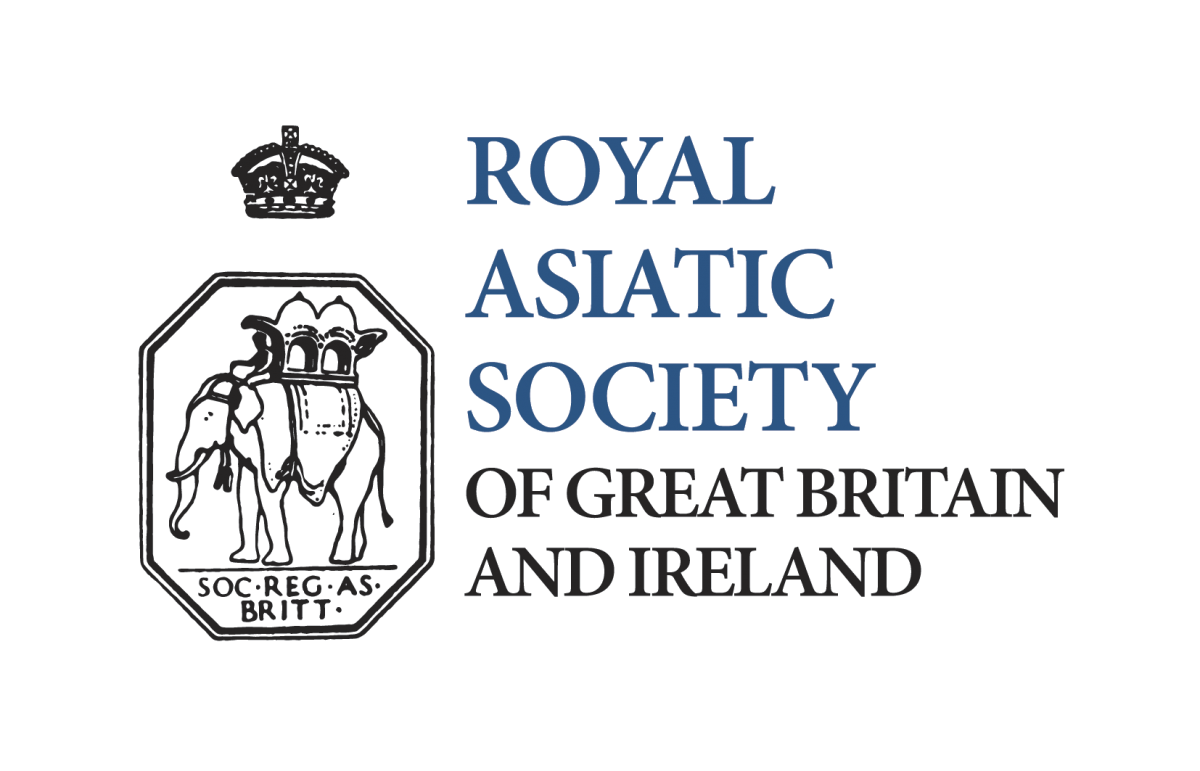Commemorating Richard Winstedt and Celebrating Volunteers
Four weeks ago, in his blog post RAS President, Tony Stockwell, wrote about Sir Richard Winstedt and his roles in the Malayan Civil Service, at SOAS, and as author of many publications on Malay language, culture and history. This week I want to return to Winstedt as today, 2 June, marks the anniversary of his death. He died on this day in 1966 at the age of 87.
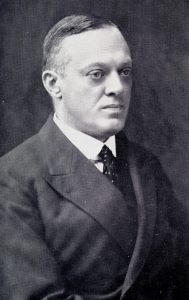
As Professor Stockwell wrote, Winstedt was very involved with the Royal Asiatic Society, serving either as Director, President and finally Honorary Vice-President, from 1940 until his death. Though we have few of his personal papers, the majority being held in the archives at SOAS, I have found evidence of his activities as I have been cataloguing the different institutional archives. Using his name as a search term within our Archive Hub records, I found that he appears in 18 different catalogues and with many of the institutional records still in need of cataloguing, I am sure he will appear in many more. I won’t encumber you with the whole list but highlight just a few of them.
We find that he was often involved in administrating the Society’s Universities Prize Essay. This prize was instituted in 1931 to replace the Public School Medal. The change was finalised on 15 December 1931 and the first prize was awarded to Norman Richard Seddon of Balliol College, Oxford, in 1933. Professor Perceval Yetts designed a certificate to be presented with the cash prize. Unfortunately Seddon was unable to receive his in person, as by the time it was awarded he had graduated from Oxford and was working in Baghdad.
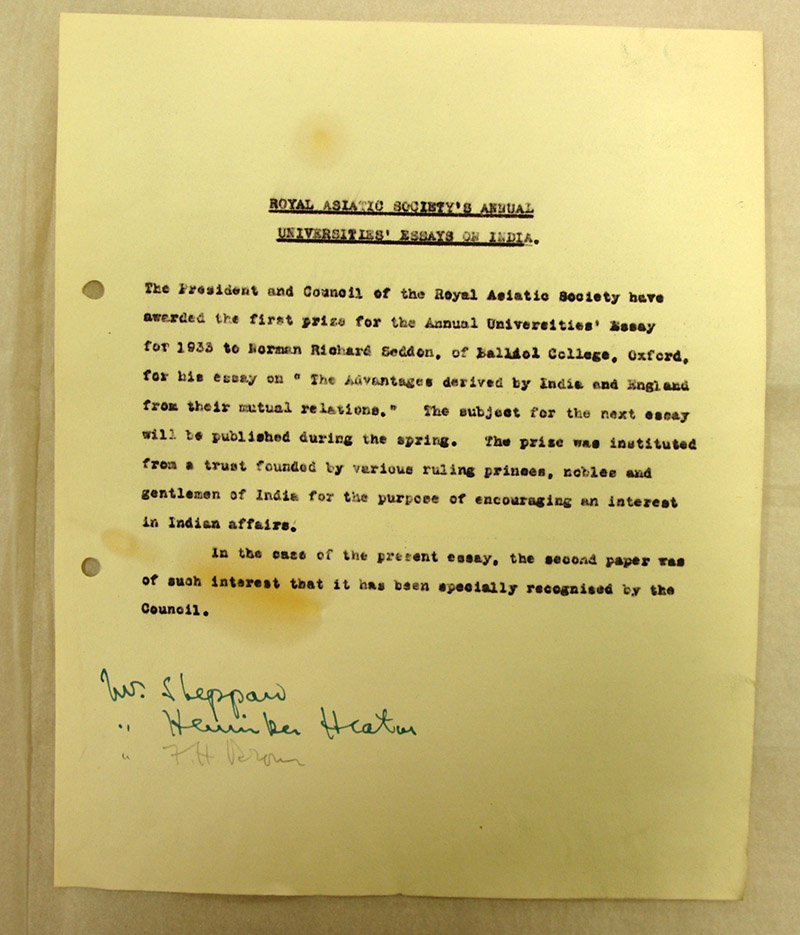
Winstedt’s involvement with the Essay begins in 1938 when he sent a letter to Colonel Hoysted, the then Secretary, to suggest essay titles for the 1939 competition. That year, he was on the panel to read the essays along with A.J. Arberry and D.L.R. Lorimer.
Arberry was a scholar of Arabic, Persian and Islamic Studies and held posts at the University of Cairo, India Office Library, the Ministry of Information, SOAS, and the University of Cambridge. He was actively involved in the Gibb Memorial Trust, the source of some of our recent blog posts. D.L.R. Lorimer was employed in the India Political Service from 1903 to 1924, serving as the British representative in Cairo during the First World War. Lorimer was a scholar of the peoples of Hunza and Gilgit . He worked also as a linguist with the languages of Iran and Pakistan, producing a work on Burushaski, a language spoken only in the Karakoram in what is today Pakistan. The Society holds some of Lorimer’s papers concerned with his interest in Gilgit.
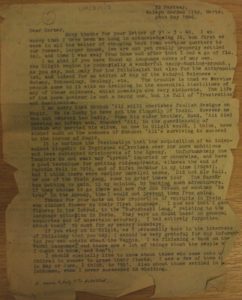
The winner in 1939 was Asa Briggs, a student at Sidney Sussex College, Cambridge. Briggs went on to work at Bletchley Park in World War Two. After the war he pursued an academic career at Oxford, Princeton, Leeds, Sussex and the Open University. He was created a life peer in 1976. His publications included a five volume text on the history of broadcasting in the UK.
We find Richard Winstedt also involved in the administration of the Triennial Gold Medal, of which he was also a recipient, and the Richard Burton Memorial Medal, including a copy of his letter of thanks, as President of the RAS, to the Foreign Office for the gift of Burton’s walking stick from the King of Dahomey and consular hat.
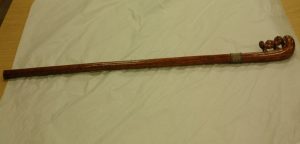
Besides the many institutional records in which Winstedt’s name came be found, he is also linked with two sets of personal papers. The first are those of Horace Geoffrey Quaritch Wales, an administrator and archaeologist. In 1936 we find Winstedt corresponding with Quaritch Wales over the possibilities of excavation in Perak, Malaysia (GB 891 QW/6/1/2). In 1937, he writes again to congratulate Quaritch Wales on receiving a grant to fund the excavation and suggesting the Kedah area as a possible fruitful place (GB 891 QW/6/1/4). Winstedt continues to correspond with Quaritch Wales through 1938 whilst Quaritch Wales was out in Malaysia including suggesting he writes an article for the Journal of the Royal Asiatic Society (GB 891 QW/6/1/24).
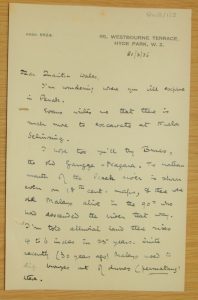
The other set of personal papers are those of Dora Gordine, the sculptor. Gordine met Winstedt when out in Asia and he was working in the Malay Civil Service. She was invited to lecture on Asian art at the Royal Asiatic Society by Winstedt in the 1940s and also contributed some articles to the Society’s Journal.
In connection with the Gordine Papers, Professor Stockwell related, via email, a ‘gem’ he had found in the RAS Council Minutes for 2009 in which it was recorded: ‘The head of R.O. Winstedt had now returned to the RAS’! His head hadn’t been exhumed from the grave to be embalmed and given pride of place in the Society’s Council Room. This Minute was, of course, relating to the sculpture executed by Gordine and which had been on exhibition at her home in Kingston, London.
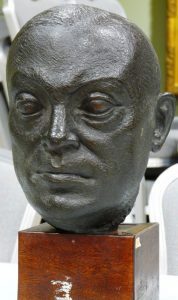
Before finishing this blog post, I wanted to, not commemorate, but celebrate the volunteers who have worked with us. This week (1-7 June) is National Volunteers Week in the UK, an annual celebration of the contribution people make by volunteering across the UK. We have been very fortunate to benefit from many hundreds of hours of peoples’ time in helping with our collections. Our longest serving volunteer is Roger Parsons, pictured below in 2011 with the then RAS Librarian, Kathy Lazenbatt. Roger, currently (well before Covid-19) spends his time cataloguing Library Books on to our online system, but over the years has undertaken a multitude of tasks including the detailed listing of the Henry Creswicke Rawlinson Papers.

We are also grateful to other long-serving volunteers from the Arts Society who come monthly to mend books and pamphlets. We never seem to run out of work for them, despite them having applied themselves to the task from before the Society moved to its current premises in Stephenson Way. But over the years we have had many volunteers, some coming for a few weeks, others a few months and some for several years. Before lockdown we had four volunteers working with us besides those already mentioned and we are very grateful for their services to the Society and particularly to its Collections.
